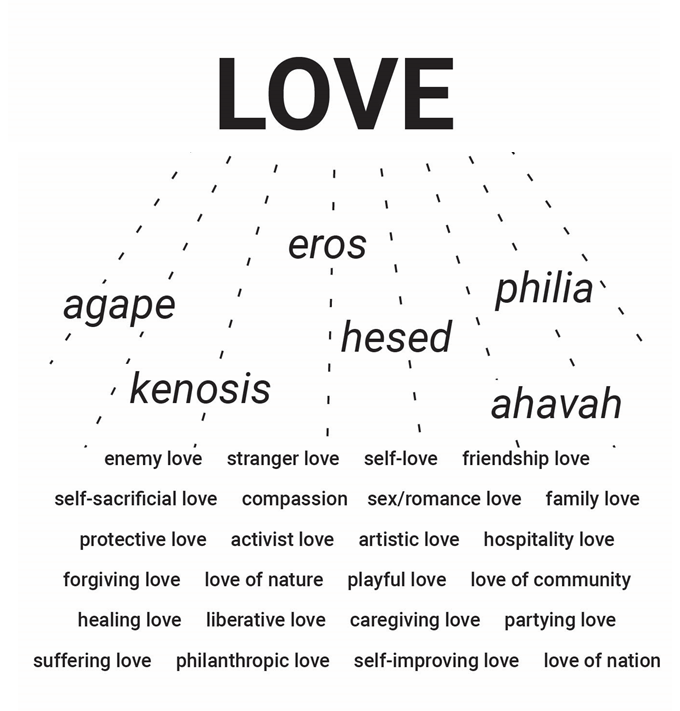God’s Pluriform Love for Us
Most Christian theologies restrict divine love. According to many, God only expresses agape. According to others, God only expresses eros.
Some theologies may say God expresses hesed but cannot affirm divine ahavah. Other theologians mix and match love, depending on their philosophical and theological assumptions.
In my new book, Pluriform Love, I argue that God expresses agape, eros, philia, kenosis, ahavah, hesed, and more. Divine love is pluriform.
Love’s Meaning is Uniform; Love’s Expressions are Pluriform
The biblical witness, the history of creation, and our lives bear witness to God at work in wild and wonderful ways. Our imitating God requires that we express pluriform love. The diversity of love forms to which God calls fills a lifetime of enjoying and sharing abundant life.
To illustrate visually how I understand the definition of love as uniform but its expressions as pluriform, I offer the figure below. Note that some forms mentioned are quite broad, while others are fairly specific.

There are millions more forms of love than I list. And many forms mix with others.
For instance, I can both love my daughter by appreciating her value and love her by expressing my disappointment that she made an unhealthy decision. I can act for my nation’s well-being in collaboration with others while actively opposing policies the majority seem to adopt. And so on.
God’s love is mixed too. God both loves by appreciating the value of creatures while loving in anger when they abuse one another. Rather than one-dimensional, God’s love is pluriform.
3 Primary Ways God Loves Us
God loves creation in at least three primary ways.
First, God acts for creation’s good, even when creatures harm themselves and others. God loves even when we are unfaithful to God and the well-being of all. God’s love takes the form of acting for good in spite of the negative that creatures have done.
As a forgiving lover, God expresses agape.
Second, God acts for creation’s good when encountering its intrinsic value. This form of divine love does good because of the beauty, worth, and importance of creation. The world God created and creates is good.
As an artistic lover, God expresses eros.
Third, God loves by coming alongside creatures in the work of promoting well-being. God empowers and seeks collaboration from creation for the common good.
As a loving friend, God expresses philia.
Each broad form of divine love takes various expressions. But in each, God seeks to promote well-being.
For More…
For more on these ideas and many more, see Pluriform Love: An Open and Relational Theology of Well-Being.

Comments
Professor Oord, your work of publication has taken hold of me for new inspiration! I resonate deeply with ORT concepts. You have put into dialogue many of the thoughts that I’ve had for a few years now. I’m a teacher at an on line school where the majority of our students are West African citizens in full time ministry or studying to be so. We teach unconditional love of God and finished work of Christ for ultimate salvation of all. Like you, I can’t believe God will ever give up on anyone. So eventually and how ever long into everlasting time All will finally “bow the knee” in humble Thanksgiving. Amen! So happy to have found your work of ministry!
Sincerely,
Shane Gabbert
Thanks for your kind and encouraging note, Shane! I’m happy to hear we think similarly!
Dear Professor Oord: I am a recently retired professor/theologian within the Roman Catholic tradition and have pretty much spent my academic career studying mysticism and spirituality, particularly that of John of the Cross. Notwithstanding the richness I have personally experienced when engaging John’s work I must say reading your latest work Pluriform Love has inspired me at an entirely new level. I’m grateful that somebody in your office had reached out to me to offer me a complimentary copy. When the book arrived a few weeks ago I gobbled it up with great pleasure. Thank you for this insightful and meaningful analysis of divine/human love.
Wonderful formulation, Mr. Oord! In the mix of challenges in modern society, I´ve found it important to address the issue of “objective language” that is so widespread in valuing “the science,” by sustaining a clear position towards restoring its anchors as scientific “natural philosophy,” now better put as “scientific philosophy.”
Naturally, that requires understanding the position of scientific philosophy in broader relation to the rest of the University-based disciplines, the phenomena they study, and the knowledge they generate through empiricism.
Here, I see that you indeed are establishing an empirical basis for theological reflection, or the philosophy of religion about the existence and nature of God.
Great work. I wish I could get your book, and perhaps one day I´ll have the resources to do so! Stay kind, stay curious, and stay connected to Divine Love in our spiritual-religious tradition with structured pluralism, as I suggest calling it.
David, Thanks for your kind and encouraging post! I’m happy you enjoyed Pluriform Love. Please keep in touch with me!
Tom
I like the way you think, Mark! Thanks for posting your reflections!